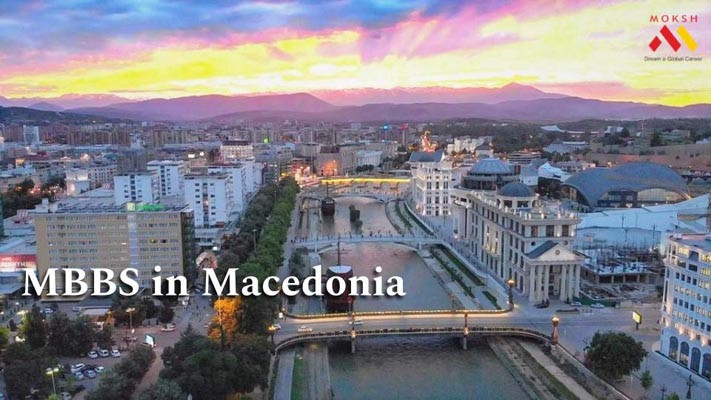
Overview
Are you considering studying MBBS in Macedonia? This small, yet diverse country located in the Balkans offers a unique student experience that combines excellent education with a rich cultural heritage and exciting lifestyle opportunities.
Macedonia, often referred to as the Republic of North Macedonia, is a nation in the midst of Europe's Balkan Peninsula. Skopje is the capital and largest city, while Ohrid, Bitola, and Prilep are other notable cities. Further, the country has a population of around 2 million people, with the majority speaking Macedonian, Albanian, or Turkish.
Quick Facts:
| Country | Macedonia |
| Capital: | Skopje |
| Total Population: | 20 Lacs Approx |
| Languages Spoken: | Macedonian (official), Albanian and Turkish |
| Currency: | Macedonian Denar (MKD) 1 MKD = ~ 1.45 INR |
| Medicine Degree Awarded | MD (Master's Degree) |
| Duration of Course | 6 Years |
Medical Education in Macedonia
Medical education in Macedonia typically consists of a six-year program, which includes both theoretical coursework and practical training. The program is divided into two cycles: the preclinical cycle, which covers the first three years, and the clinical cycle, which covers the last three years.
The Macedonian medical curriculum is created to give students a thorough education in medical theory and practice and to equip them for a profession in medicine. The Medical Universities in Macedonia follow the ECTS System.
After completing the six-year MBBS program, students must pass a state exam in order to obtain a medical license and practice medicine in Macedonia. Additionally, they can choose to pursue further specialization through residency programs, which typically last for three to six years, depending on the specialty.

Why Study MBBS in North Macedonia
Barriers when studying MBBS in Macedonia
Medical Universities in Macedonia
The following is a list of some of Macedonia's medical schools:
It should be noted that this is not a complete list, and there may be further governmental and private medical schools in Macedonia.
| Medical School | City | Estd | Type |
|---|---|---|---|
| Ss. Cyril and Methodius University (UKIM) | Skopje | 11465 | Public |
| University of Tetovo | Tetovo | 1994 | Public |
| Goce Delcev University | Stip | 2007 | Public |
Public Medical Schools
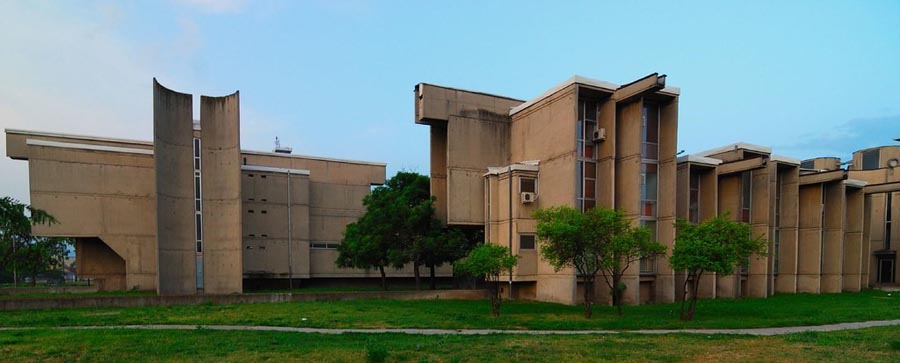
1. Ss. Cyril and Methodius University- The Saints Cyril and Methodius University (UKIM) in Skopje is the oldest and largest public university in North Macedonia. Formed in 1949, with three faculties at first. There are currently 23 faculties, 5 research institutes, and 4 public scientific entities that make up the University's functional community. The annual tuition for overseas students in the medical program is approximately 2600 Euros.
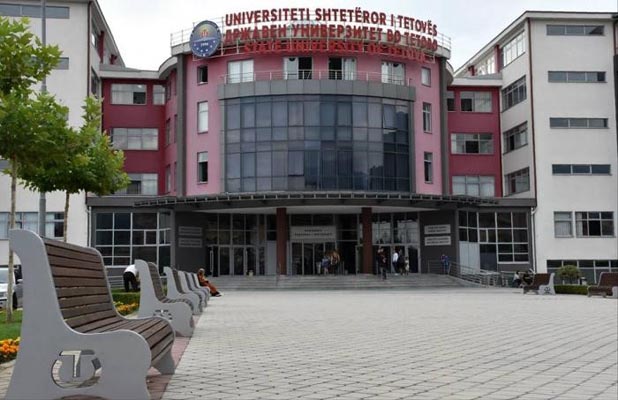
2. University of Tetovo- A state university in North Macedonia is called the State University of Tetova. This higher education institution was established on 17 December 1994 and was recognized as a state university by the national government in January 2004.The tuition fees for medicine program international students are about 2,500 EUR/ year.
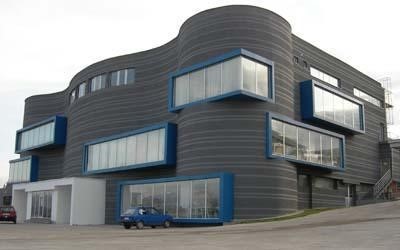
3. Goce Delcev University- A public university in North Macedonia is called the Goce Delcev University of Stip. The university, which was established in 2007, comprises twelve faculties and three academies. The institution had 13,000 students enrolled as of the 2010–2011 academic year. The medical school is affiliated with the European University Association. For overseas students enrolled in the medical program, the annual tuition is around 1000 EUR.

Medicine Syllabus in Macedonia
In Macedonia, the medical curriculum is planned into two cycles: the preclinical cycle and the clinical cycle. The preclinical cycle focuses on basic medical sciences, whereas the clinical cycle emphasizes clinical medicine and practical experience. Below is a summary of Macedonia's medical curriculum:
Preclinical cycle: The Preclinical cycle consists of study subjects such as Anatomy, Histology, Physiology, Biochemistry, Medical Microbiology, Pathology, Pharmacology, Medical psychology, Medical sociology, and Medical ethics.
Clinical cycle: The Clinical cycle consists of study subjects such as Internal medicine, Surgery, Pediatrics, Obstetrics and Gynecology, Neurology, Psychiatry, Dermatology, Radiology, Emergency medicine, Family medicine, and so on.
Language of Instruction
The language of instruction in universities in Macedonia is primarily Macedonian, but some programs are also offered in English, Albanian, or Turkish. International students who do not speak Macedonian can take language courses at universities or private language schools.

Cost of studying MBBS in Macedonia
Depending on the university and the course, studying medicine in Macedonia might cost a variety of amounts. Yet, in comparison to other European nations, Macedonia often charges lower tuition for medical courses.
Tuition for medical education at public universities in Macedonia ranges from about €1000 to €3,000 per year. The annual tuition expenses at private universities may be higher, ranging from €4,000 to €10,000.
However, the students may also need to cover the expenses for textbooks, living expenses, and other related expenditures including health insurance, visa fees, and housing in addition to the cost of tuition.
Note that: Tuition costs and other expenses are subject to modification and may diverge from year to year.

Scholarships in Macedonia for international students
Foreign students can apply for a variety of scholarships offered by the Macedonian government and universities. You must meet a few eligibility margins in order to receive the benefits, though.
Some scholarship programs are available for international students in Macedonia-
Syllabus of MBBS in Macedonia
Find the curriculum for studies in general medicine in Macedonian Universities-
| Year | Subject | Teaching Hours |
|---|---|---|
| 1st | Biophysics | 30 |
| Morph.physio cell | 60 | |
| Anatomy 1 | 90 | |
| Introduction to Medicine | 30 | |
| Medical psychology | 60 | |
| Histology embryology 2 | 60 | |
| Hospital foster care1 | 30 | |
| Chemistry | 90 | |
| Anatomy 2 | 90 | |
| Histology embryology 2 | 75 | |
| Social medicine | 30 | |
| Medical ethics | 30 | |
| Introduction to Human Genetics | 60 | |
| Biochemistry 1 | 105 | |
| 2nd | Physiology 1 | 150 |
| Introduction to Medical | 45 | |
| Immunology statistics and computer science | 45 | |
| Anatomy | 90 | |
| Physiology 2 | 90 | |
| Biochemistry 2 | 75 | |
| Microbiology Parasitology 1 | 60 | |
| Pathophysiologist 1 | 105 | |
| Hygiene | 75 | |
| Basics of scientific work | 30 | |
| Microbiology Parasitologist 2 | 75 | |
| 3rd | Pathophysiologist 2 | 60 |
| Pathology | 135 | |
| Clinical examination | 100 | |
| Radiology | 60 | |
| Nuclear medicine | 30 | |
| Pathology 2 | 120 | |
| Clinical trial | 115 | |
| Pharmacology | 105 | |
| Epidemiology | 75 | |
| Tranfusionist | 30 | |
| Internal medicine | 205 | |
| 4th | Infectology | 105 |
| Dermatovenerology | 75 | |
| Neurology | 90 | |
| Internal medicine | 150 | |
| Surgery | 160 | |
| Gynecology | 90 | |
| Clinical pharmacologist | 30 | |
| Clinical biochemistry | 30 | |
| Oncology | 45 | |
| 5th | Surgery | 175 |
| Gynecology | 105 | |
| Pediatrics | 90 | |
| Orthopedics | 45 | |
| Pediatrics | 90 | |
| Psychiatry | 90 | |
| ORL | 90 | |
| Ophthalmology | 60 | |
| 6th | Internal medicine | 320 |
| Surgery | 320 | |
| Gynecologist. | 160 | |
| Pediatrician. | 120 | |
| Public Health | 80 | |
| Total | 5235 |
Cost of studying MBBS in Macedonia
Depending on the university and the course, studying medicine in Macedonia might cost a variety of amounts. Yet, in comparison to other European nations, Macedonia often charges lower tuition for medical courses.
Tuition for medical education at public universities in Macedonia ranges from about €1000 to €3,000 per year. The annual tuition expenses at private universities may be higher, ranging from €4,000 to €10,000.
However, the students may also need to cover the expenses for textbooks, living expenses, and other related expenditures including health insurance, visa fees, and housing in addition to the cost of tuition.
Note that: Tuition costs and other expenses are subject to modification and may diverge from year to year.
Scholarships in Macedonia for international students
Foreign students can apply for a variety of scholarships offered by the Macedonian government and universities. You must meet a few eligibility margins in order to receive the benefits, though.
Some scholarship programs are available for international students in Macedonia-
Macedonia Government Scholarship
UIST 'St. Paul The Apostle' Scholarship
St Clement of the Ohrid University of Bitola scholarship
The GoceDelcev University of Stip scholarship
International University of Struga scholarship
International Balkan University Scholarship
Hostel and Accommodation in Macedonia:
On-campus housing is available at most medical institutions in Macedonia, with prices ranging from €1500 to €2000 a year.
Shared apartments cost between €100 to €200, while private flats typically cost between €150 to €300.
Cost of Living in Macedonia
Housing can be one of the biggest expenses in Macedonia, with prices varying depending on the location and size of the apartment or house. In the capital city of Skopje, a one-bedroom apartment in the city center can cost around 250-350 EUR per month, while a three-bedroom apartment can cost around 500-700 EUR per month.
Admission Requirements for MBBS in Macedonia
The Admission requirements for international students to enroll in Medicine programs at Macedonian Medical Universities are stated below:
Eligibility Criteria for studying MBBS in Macedonia
To enroll in the Macedonian Medical University's medical program, the candidate needs to meet the following criteria:

Documents Required for Admission
Here is the list of documents required, for admission to MBBS in Macedonian Universities:
In addition, to these documents, some universities may require additional materials be sure to check with the University for the Specific Requirements.
Application Deadline
For the application deadline in Macedonian Universities, refer to the table below:
| Intake | Month | Last Date to Apply |
|---|---|---|
| Autumn | Sep-23 | 1st June 2023 |
| Spring | Feb-24 | 15th Nov 2023 |
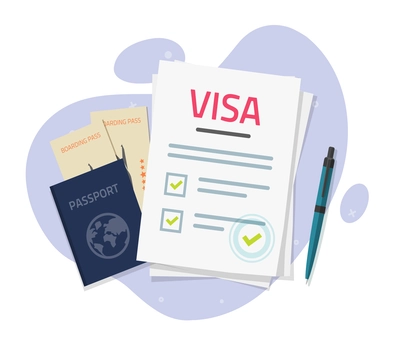
Visa processing in Macedonia for international students
As an international student, you must complete the following five easy procedures in order to get a visa for Macedonia:
1. Choose your study program: Before you can apply for a visa, you'll need to be accepted into a Macedonian educational institution. Once accepted, you'll receive an official letter of acceptance.
2. Apply for a visa: You can apply for a Macedonian visa at the Macedonian embassy or consulate in your home country. You must submit the necessary paperwork:
Your passport (valid for at least 6 months or the duration of stay in Macedonia)
3. Wait for processing: The processing time for Macedonian visas can vary, but it generally takes several weeks to a month. Hence, apply for your visa as early as possible to steer clear of any delays.
4. Travel to Macedonia: Once your visa has been approved, you can travel to Macedonia. Do remember to bring your passport and visa.
5. Register with local authorities: You must register with the local authorities within five days of arriving in Macedonia. You can get assistance from your educational institution during this process.
Part-Time work during Study in Macedonia
As an international student, you could be considering your choices for part-time employment while studying abroad in Macedonia. Here are some things to remember:
1. Eligibility: International students who are enrolled in full-time studies are eligible to work part-time in Macedonia. However, it is important to check the specific rules and regulations related to work permits and visas for international students.
2. Job options: Part-time job options for international students in Macedonia may include working in the service industry, such as in restaurants or cafes, or working as a tutor or research assistant. It is important to keep in mind that Macedonian is the official language of the country, so proficiency in the language may be required for certain jobs.
3. Work hours: During the academic year, international students are permitted to work up to 20 hours per week, and they can work full-time during university breaks.
4. Financial considerations: While part-time work can provide some extra income, it is important to ensure that it does not interfere with your studies. It is also important to consider the cost of living in Macedonia and whether a part-time job will be sufficient to cover expenses.
Overall, part-time work can be a great way for international students to gain work experience and earn some extra income while studying in Macedonia.
Frequently Asked Questions
What are the admission requirements for MBBS in Macedonia?
Ans. To be admitted to medical school in Macedonia, you need to have completed high school education or its equivalent and pass an entrance exam. The entrance exam consists of multiple-choice questions in the subjects of biology, chemistry, and physics.
How long does it take to complete the medicine program in Macedonia?
Ans. Medical School in Macedonia typically takes six years to complete. This includes both theoretical coursework and practical training.
Is medical education in Macedonia recognized internationally?
Ans. Yes, medical education in Macedonia is recognized internationally. The Faculty of Medicine is accredited by the Ministry of Education and Science of the Republic of Macedonia and recognized by the World Health Organization.
What is the language of instruction in medical schools in Macedonia?
Ans. The language of instruction in medical schools in Macedonia is primarily Macedonian. However, some medical schools may offer courses in English as well.
What career opportunities are available after completing medical education in Macedonia?
Ans. After completing medical education in Macedonia, graduates can pursue a variety of career opportunities, such as general practice, medical research, or specialization in a particular medical field. To practice medicine in Macedonia, graduates must pass a state exam and obtain a medical license.








